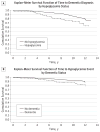Association between hypoglycemia and dementia in a biracial cohort of older adults with diabetes mellitus
- PMID: 23753199
- PMCID: PMC4041621
- DOI: 10.1001/jamainternmed.2013.6176
Association between hypoglycemia and dementia in a biracial cohort of older adults with diabetes mellitus
Abstract
Importance: Hypoglycemia commonly occurs in patients with diabetes mellitus (DM) and may negatively influence cognitive performance. Cognitive impairment in turn can compromise DM management and lead to hypoglycemia.
Objective: To prospectively evaluate the association between hypoglycemia and dementia in a biracial cohort of older adults with DM.
Design and setting: Prospective population-based study.
Participants: We studied 783 older adults with DM (mean age, 74.0 years; 47.0% of black race/ethnicity; and 47.6% female) who were participating in the prospective population-based Health, Aging, and Body Composition Study beginning in 1997 and who had baseline Modified Mini-Mental State Examination scores of 80 or higher.
Main outcome measures: Dementia diagnosis was determined during the follow-up period from hospital records indicating an admission associated with dementia or the use of prescribed dementia medications. Hypoglycemic events were determined during the follow-up period by hospital records.
Results: During the 12-year follow-up period, 61 participants (7.8%) had a reported hypoglycemic event, and 148 (18.9%) developed dementia. Those who experienced a hypoglycemic event had a 2-fold increased risk for developing dementia compared with those who did not have a hypoglycemic event (34.4% vs 17.6%, P < .001; multivariate-adjusted hazard ratio, 2.1; 95% CI, 1.0-4.4). Similarly, older adults with DM who developed dementia had a greater risk for having a subsequent hypoglycemic event compared with participants who did not develop dementia (14.2% vs 6.3%, P < .001; multivariate-adjusted hazard ratio, 3.1; 95% CI, 1.5-6.6). Further adjustment for stroke, hypertension, myocardial infarction, and cognitive change scores produced similar results.
Conclusion and relevance: Among older adults with DM, there seems to be a bidirectional association between hypoglycemia and dementia.
Conflict of interest statement
Figures
Comment in
-
Glucose control in older adults with diabetes mellitus--more harm than good?JAMA Intern Med. 2013 Jul 22;173(14):1306-7. doi: 10.1001/jamainternmed.2013.6189. JAMA Intern Med. 2013. PMID: 23753259 No abstract available.
-
Cognitive impairment is a major risk factor for serious hypoglycaemia; public health intervention is warranted.Evid Based Med. 2014 Apr;19(2):77. doi: 10.1136/eb-2013-101525. Epub 2013 Nov 6. Evid Based Med. 2014. PMID: 24195968 No abstract available.
References
-
- Cukierman T, Gerstein HC, Williamson JD. Cognitive decline and dementia in diabetes: systematic overview of prospective observational studies. Diabetologia. 2005;48(12):2460–2469. - PubMed
-
- Profenno LA, Porsteinsson AP, Faraone SV. Meta-analysis of Alzheimer’s disease risk with obesity, diabetes, and related disorders. Biol Psychiatry. 2010;67(6):505–512. - PubMed
-
- Biessels GJ, Staekenborg S, Brunner E, Brayne C, Scheltens P. Risk of dementia in diabetes mellitus: a systematic review. Lancet Neurol. 2006;5(1):64–74. - PubMed
-
- Bonds DE, Miller ME, Bergenstal RM, et al. The association between symptomatic, severe hypoglycaemia and mortality in type 2 diabetes: retrospective epidemiological analysis of the ACCORD study. [Accessed April 11, 2013];BMJ. 2010 340:b4909. http://www.ncbi.nlm.nih.gov/pmc/articles/PMC2803744/ - PMC - PubMed
Publication types
MeSH terms
Substances
Grants and funding
LinkOut - more resources
Full Text Sources
Other Literature Sources
Medical


